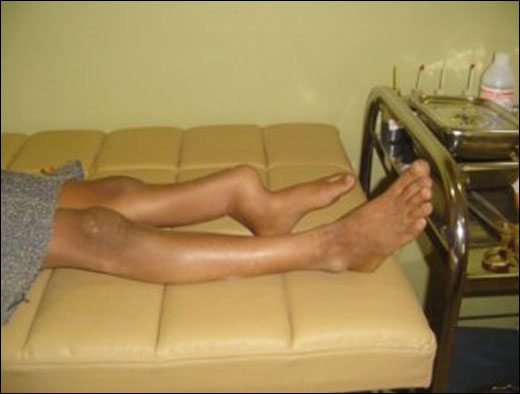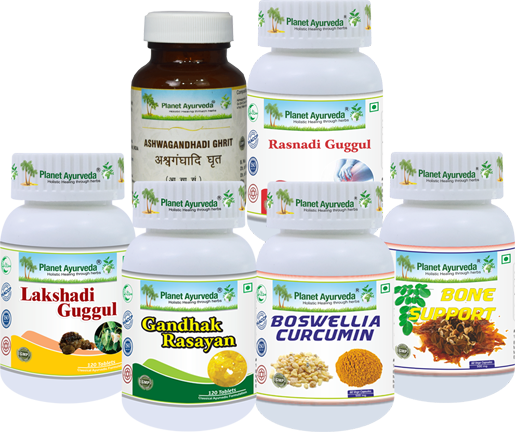Ayurvedic Treatment for Fibrous Dysplasia with Herbal Remedies
Abstract
Bones are one of the important structures of the body as they provide a framework to the body. It helps protect the internal organs of the body and works with muscles to help the body to move. It provides protection to the vital organs of the body like the lungs, heart and brain from any external injury. It also stores calcium, growth factor, vitamin D and phosphorus. Bone marrow in the bones helps in red blood cell production. Normal functioning of the bones is effective for proper working of the body. Any abnormality or disease condition affects body functions. Here, in this article, we are going to study such a condition of bone which is called Fibrous Dysplasia. This is a bone developmental abnormality which occurs when fibrous tissue replaces the normal bone and marrow of the bone. Let’s start studying Fibrous dysplasia in detail!
Introduction
Fibrous Dysplasia is a rare bone condition in which bone becomes weaker as the healthy bone is replaced by fibrous tissue. It is a benign intramedullary lesion which is fibro-osseous in nature. It is the anomaly of the development of bone due to which the bone growth becomes weaker and also affects the shape of the bones. The chances of fractures are higher in patients with Fibrous Dysplasia as this condition causes bone ossification and makes tissue fibrous. These can make bones more fragile and increase the chances of fractures. This condition can affect any bone in the body but most commonly affects the long bones of the body like the femur, tibia, ribs, skull, humerus and pelvis. The condition of Fibrous Dysplasia can occur on its own or may be part of McCune-Albright Syndrome (MAS). McCune-Albright Syndrome (MAS) is a genetic condition which causes Fibrous Dysplasia, scar-like tissue on the bones, skin pigmentation and increased functions of the endocrine gland. In this article, we are going to study in detail the types, causes, signs and symptoms, diagnosis, diet, Ayurvedic overview and treatment. Also, we look at the herbal remedies of Planet Ayurveda for the management of the condition of Fibrous Dysplasia. Let’s start!

Types Of Fibrous Dysplasia
There are two types of Fibrous Dysplasia on the basis of the number of bones that are affected by this condition. These are as follows:
- Monostotic Fibrous Dysplasia is the most common type of fibrous dysplasia. In this type of fibrous dysplasia, one bone is affected. As this condition commonly occurs in long bones, so the Femur and Tibia are usually involved.
- Polyostotic Fibrous Dysplasia is more severe as compared to monostotic type of Fibrous Dysplasia. It affects more than one bone in the same limb or can also affect the multiple bones of the body. When the skeletal system of the whole body is involved, then the condition is known as Panostotic.
Causes Of Fibrous Dysplasia
The condition of Fibrous Dysplasia is a genetic condition which occurs due to the mutation of chromosome 20 which is responsible for the formation and growth of the bone. This gene mutation causes the inability to mature the bone-forming cells. As a result, it forms abnormal fibrous tissues. The causes of the gene mutation in this condition are not known exactly. It is not an inherited condition because this mutation of genes mainly occurs after conception. As this mutation mostly occurs in early pregnancy, it commonly occurs in the single bones. It is a benign condition which means it does not spread from one bone to another.
Signs Of The Fibrous Dysplasia
Signs of Fibrous Dysplasia depend on the number of bones affected and the bones involved in which part of the body. The person with Fibrous Dysplasia may show the following signs:
- Fatigue
- Weakness of the affected area
- Fractures
Symptoms Of Fibrous Dysplasia
Patients with Fibrous dysplasia may or may not show any particular symptoms. When a patient presents symptoms of Fibrous Dysplasia, it may be as follows:
- Pain in the affected area
- Bone Fracture
- Bone Deformity
- Difficulty in walking (when Femur is involved)
- Skin pigmentation
- Hormonal disturbance
- Facial asymmetry
Diagnosis Of Fibrous Dysplasia
Patients of Fibrous Dysplasia commonly do not show any symptoms. For the diagnosis of Fibrous Dysplasia, a proper medical history must be taken. Following are some of the diagnostic tests that can be done:
- X-rays show the dense structure of the bone and in this condition, it shows bone deformity or any abnormal area similar to ground glass in appearance.
- Bone scan to evaluate bone growth
- MRI (Magnetic Resonance Imaging) to evaluate lesions
- CT (Computed Tomography) to check bone fracture and the quality of the bone
- Biopsy to check abnormal cells or cancer
- Blood and urine tests to check increased levels of enzymes
Ayurvedic Overview Of Fibrous Dysplasia
Fibrous Dysplasia is a rare bone condition in which the normal bone is replaced by fibrous tissues. Bone shape can also be affected in this condition. It occurs due to a mutation in the gene which occurs in chromosome 20 which is responsible for bone growth. In Ayurveda, the chromosomal abnormality can be correlated with Beeja Bhaga Avayava Dushti. All three Dosha i.e. Vata, Pitta and Kapha are involved in this condition. Due to continuous consumption of causative factors like improper diet and other factors vitiate Vata, Pitta and Kapha (Vata predominance) which affects the microchannels of the body. Monostotic and polyostotic conditions are mainly controlled by Vata dosha whether it affects one bone or multiple bones. The description of Beej Bhaga Dushti is found in the Khuddika Garbhavakranti chapter of Charak Samhita. According to Ayurvedic text,
यच्चोक्तं- यदि च मनुष्यो मनुष्यप्रभवः, कस्मान्न जडादिभ्यो जाताः पितृसदृशरूपा भवन्तीति;
तत्रोच्यते-यस्य यस्यह्यङ्गावयवस्य बीजे बीज भाग उपतप्तो भवति,
तस्य तस्याङ्गावयवस्य विकृतिरुपजायते, नोपजायते चानुपतापात्;तस्मादुभयोपपत्तिरप्यत्र|
सर्वस्य चात्मजानीन्द्रियाणि, तेषां भावाभावहेतुर्दैवं; तस्मान्नैकान्ततो जडादिभ्यो जाताः पितृसदृशरूपा भवन्ति||
Ancient Reference – (चरक संहिता शारीरस्थान 3/17)
The above Ayurvedic texts first raise the question: if a human is the origin of another human then why do not those born of dullness and others become like the father? Sperm and ovum i.e. Beej (Seed) plays a major role in this. The chromosome (seed) plays a major role in the development of any organ and when this chromosome is affected somehow, it affects the respective organ of that chromosome. A healthy organ is developed in the case of healthy chromosomes. So there is a possibility of these two conditions. The concept of past actions (Karma) is also responsible for the existence of sense organs which are derived from the souls. So, it is not necessary that the progeny of dull parents may resemble that aspect. It can also depend on the child’s chromosomes.
Ayurvedic Treatment Of Fibrous Dysplasia
The condition of Fibrous Dysplasia is correlated with Beej Dushti in Ayurveda. As there is a mutation in chromosomes which occurs in the pregnancy period. So, this congenital condition can be managed by proper Ayurvedic treatment. Some Ayurvedic herbs like Ashwagandha (Withania somnifera), Guggul (Commiphora mukul), Hadjod (Cissus quadrangularis) and Turmeric (Curcuma longa). A proper Shodhan (Purification) therapy is very effective in this condition. For healthy progeny, a proper purification procedure should be done before conception which helps in removing toxins from the body and keep the levels of hormone normal. The process or Shodhan includes the following procedures:
- Snehana (Oleation)
- Swedana (Sudation)
- Vamana (Therapeutic emesis)
- Virechana (Therapeutic purgation)
- Anuvasana or Asthapana Basti (Medicated enema)
- Uttar Basti (Enema for females)
Herbal Remedies Of Planet Ayurveda For Fibrous Dysplasia
Planet Ayurveda manufactures a wide variety of Ayurvedic herbs in the form of decoction, oil, capsules and tablets. Planet Ayurveda follows the ancient text of Ayurveda in the formation of herbal medicines. All formulations are formed after a number of clinical tests and trials. So, the quality of all the herbal medicines is very high and effective. Planet Ayurveda offers medicines for nearly all health problems. Here, in this article, we discussed Fibrous Dysplasia. The herbal formulations for Fibrous Dysplasia are Lakshadi Guggul, Ashwagandha Ghrit, Boswellia Curcumin, Gandhak Rasayan, Bone Support Capsules and Rasnadi Guggul. The detailed description of these products is as follows:
- Lakshadi Guggul
- Ashwagandha Ghrit
- Boswellia Curcumin
- Gandhak Rasayan
- Bone Support Capsules
- Rasnadi Guggul
Products Description
1. Lakshadi Guggul
Lakshadi guggul of Planet Ayurveda contains Laksha (Laccifer lacca), Hadjod (Cissus quadrangularis), Arjuna (Terminalia arjuna), Ashwagandha (Withania somnifera) and many more. It helps in maintaining healthy bones and is also effective in healing fractured bones. It contains binding properties and is rich in calcium. It relieves pain occurring in the bones.
Dosage: 2 tablets twice a day with lukewarm water.
2. Ashwagandha Ghrit
This formulation contains ingredients like Ashwagandha (Withania somnifera), Bibhitaki (Terminalia bellirica) and many more. It helps in supporting bone density and maintaining hormonal balance. Ashwagandha helps in improving pain and mobility and helps in enhancing the strength of the bones.
Dosage: 1 teaspoon twice daily with warm water.
3. Boswellia Curcumin
Boswellia Curcumin of Planet Ayurveda contains Shallaki (Boswellia serrata) and Curcumin (Curcuma longa). It is very effective for Fibrous Dysplasia as it contains anti-inflammatory and antioxidant properties which help reduce inflammation in the bones. It also helps in relieving pain and enhancing bone health. It improves blood circulation.
Dosage: 2 capsules twice daily with water after meals.
4. Gandhak Rasayan
Gandhak Rasayan contains Gandhk (Purified sulphur), Cinnamon (Cinnamomum zeylanicum), Ela (Elettaria caramomum), Guduchi (Tinospora cordifolia) and many more. It is useful in increasing the immunity of the body. It eliminates harmful toxins from the body and maintains Vata, Pitta and Kapha dosha. It helps in relieving pain.
Dosage: 2 tablets twice daily after meals with water.
5. Bone Support Capsules
Bone Support capsules of Planet Ayurveda contain Arjuna (Terminalia arjuna), Shudh Laksha (Laccifer lacca), Hadjod (Cissus quadrangularis), Suhanjana (Moringa oleifera) and many more. It provides natural calcium and minerals to the bones. It is effective in the management of all kinds of fractures and gives strength to the bones. It supports joint mobility and maintains bone health.
Dosage: 1 capsule twice daily with water after the meals.
6. Rasnadi Guggul
Rasnadi Guggul of planet Ayurveda contains Rasna (Pluchea lanceolata), Guggul (Commiphora mukul), Erand (Ricinus communis) etc. This herbal formulation is very helpful in the management of Vata dosha and thus relieves pain. It supports bone, joint and muscle health and enhances the strength of the bone. It is effective in all types of Vataj disorders.
Dosage: 2 Tablets twice daily with water after meals.
Conclusion
Fibrous Dysplasia is a condition in which normal is replaced by fibrous tissue. This is a lesion of the bone which affects the younger age group commonly. For proper management of this condition, a complete knowledge of these lesions is necessary as it shows similarities with other conditions of fibro-osseous lesions. Monostotic Fibrous Dysplasia can be managed easily as compared to polyostotic Fibrous Dysplasia. As we know this condition occurs after conception due to mutation in the chromosome. So it can be managed by Ayurveda very effectively by purification therapy of parents before conception. Proper diet and lifestyle of a pregnant mother is necessary to avoid such type of health issues. However, Planet Ayurveda formulations are also very effective for the management of this condition very well.




